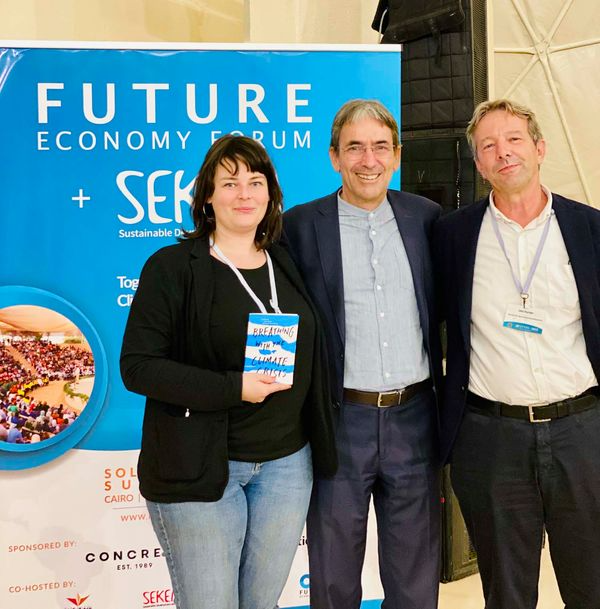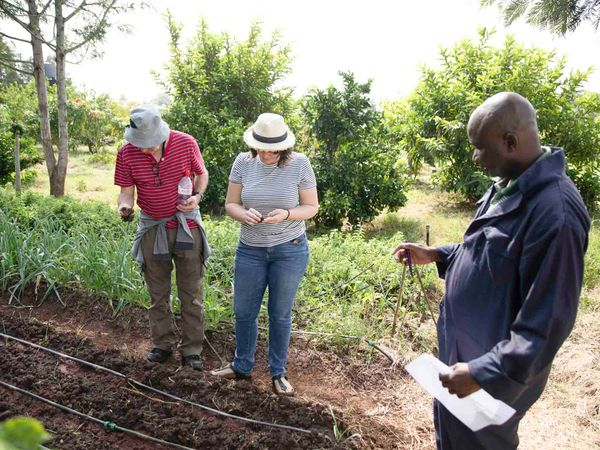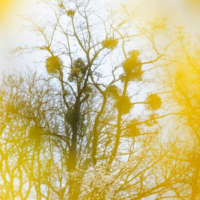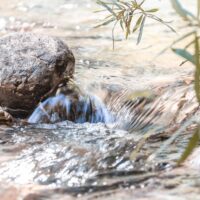Although there may be as many anthroposophical perspectives on contemporary issues as there are people, one-sided depictions of anthroposophy continue to crop up in the media. A 2022 article on climate science denial, for example, cited something published in Das Goetheanum to prove their point.1 To get a realistic picture of the Goetheanum’s current efforts on climate change issues, we spoke with Lin Bautze, a former coworker with the Agricultural Section in Dornach, about the contribution of anthroposophy and biodynamic agriculture to the environmental movement. Questions by Charles Cross.

Lin, please tell us a little bit more about yourself and your experience in this movement.
When I started, I was, 18 and a half years old, and I realized that I needed to study something about climate change. At that time, although scientific studies existed and people were aware that international governmental organizations were dealing with climate change, climate change was still not an issue many cared about. I remember a lot of train trips where I talked with people around the world, telling them what I was doing, and they were very critical about it, saying, “Why are you building your future in climate change? This is not a topic—it’s just media and press.” Since that time, around 14 or 15 years ago, a lot has changed. Throughout society, climate change is more recognized. People are less skeptical, although of course there are still critics and skeptical voices inside and outside the anthroposophical world. But climate change is becoming more and more important and more and more visible, and this is something that you can feel on a daily basis.
Why are some people still holding out? What do you think their intellectual reasons, as well as their emotional experiences, are?
When I first came across people who denied climate change, I was very angry and couldn’t really listen to them. I couldn’t understand how a person could deny climate change. Now, more and more, I try to listen to those voices and understand what is going on in their minds that they disregard so many different scientific studies.
I think one reason is that climate change is strongly associated with guilt and fear, and that’s difficult to deal with. You don’t want to feel guilty about existing, but you’re in a dilemma because if you’re in the world and you’re creating further greenhouse gas emissions, and this causes the death of so many other people all over the world, it’s hard to handle.
I also think it’s a lack of trust in science because climate change is something that is modeled into the future. It’s quite complex to understand these models—they’re not easy to grasp—and it seems to be so far in the future. So this is also a question culturally of how much you live in the moment, so to speak, and how much you live for future generations or the other people to come.
It also has to do with communication because climate change is something that is communicated in such a negative and drastic way that if you don’t feel the effects directly, then it’s difficult to understand. I think farmers have a big advantage and, at the same time, are very vulnerable because they feel the effects of climate change—they see it in their fields, they see it when they harvest their crops, they see it when they witness heatwaves affecting their animals, and so on. So, they are directly realizing the effects of climate change.
Another aspect is the willingness of people to be responsible for their own lives and not put their whole trust in politics. What I often hear is, “Yeah, I can’t do anything about climate change. It has to be decided by politics.” There’s a simultaneous powerlessness and pressure, understanding that even if you are just one person, your actions and decisions are relevant to the whole world. This is scary, and depending on what kind of person you are, it may feel overwhelming or frustrating. Where I come from in Northeast Germany, people are still quite frustrated with politics. They don’t trust politicians to deal with climate change, but at the same time, they don’t have the feeling that they have the power to do something about it themselves.
Partnership With the Earth
I can empathize firsthand with misgivings about politics. It seems that over the last few years, there’s been a lot more resistance to what people see as governmental overreach or the restriction of individual freedom. It also seems that anthroposophy is in a great position to encourage people into a type of freedom that takes responsibility for the whole or that tries to be in a relationship with community and the Earth. That brings up the spiritual side of this—what do you think anthroposophy has to offer?
When you work within the climate change debate for 15 years, you go through different phases. I can’t say that anything is a fixed issue that I won’t change my stance on. I also feel that Covid forced us to ask ourselves what our role is on Earth as humankind. What is the role of nature, or what is the interaction between humans and nature? What I have learned in these years, witnessing and listening to nature, is that each thing that exists has a role—nothing is without purpose—but everything is embedded in a larger complex thing called Earth. For many centuries, we humans took the destructive role of creating a separation between humans and nature. We felt that we emancipated ourselves from nature in a way, but I think with climate change, we feel that this is not possible anymore, even if the current debate is still concentrated on a story of fighting against climate change and fighting against extreme weather events, and so on.
Where I would like to position myself is in a balance with nature, communicating with nature, and trying to understand what we can do as individuals. It’s quite tricky. It’s like a partnership. If you come into communication with nature, then you may realize that sometimes you need to restrain yourself a little bit for the other. And you also find situations where you receive a lot from your partner. It’s a give-and-take. The question arises in me as to whether climate change brings us the possibility to really come into a collaborative effort and partnership with the Earth, which is at the same time a partnership within human society because we are inherently connected through the atmosphere. It’s seldom the case that your actions lead to effects on another continent, country, or region of the world, as we have with climate change. This helps us to connect with one another and to really develop empathy. So, for me, it’s not helpful to consider climate change as something that would like to destroy us, but rather, we can think of it as something that helps us come into a more healthy and balanced human role and purpose.
I love the description of climate change as a sort of initiation into a new or more mature stage of being human.
That, for me, doesn’t mean that climate change is not an issue. I don’t want to understate it or say that it’s not harmful. We know that people are dying daily because of extreme weather effects, and we know that harvests will decrease because of droughts, and we know that the situation will be even more drastic in the future. But I think it also provides a chance to change our perspective about how to give and take with nature. Of course, we need to act quickly and maybe drastically, but in a very holistic manner because we really need to shift the whole system to come away from overexploitation and over-harvesting the resources that we have.

A Collective Striving
The Agricultural Section recently produced a book titled Breathing with the Climate Crisis, which was also the name of a conference you hosted with the Youth Section in 2021.2 Could you tell us more about this spirit you’re emphasizing?
The idea is to translate anthroposophic or biodynamic impulses into modern language and to show how they can be used to come into collaboration with climate change rather than fighting against it. For example, we discuss the idea of the organism, which was a concept emphasized by Rudolf Steiner in many fields. In biodynamics, a farm is organized as an organism that has different elements connected with one another, so that you can have a self-sufficient, diversified farm, rather than just monocultures. The farmers that cultivate their farms according to the idea of the organism often come into very different connections with their surrounding landscape and nature. Compared to conventional or even organic farms, biodynamic farmers often find holistic solutions for problems, including environmental ones but also economic, social, and spiritual ones. The good thing about this concept is that it can be applied everywhere. It can be applied by every farmer in every region: you adapt the system to your local needs. In this way, it’s not just a concept—it can become a solution for climate change. The idea of the organism can also be applied in your garden, kitchen, or in the supermarket, because it helps you relate to the earth as a living being. You don’t have a separation between nature and humans but a collaborative effort.
The other aspects that we cover in this book are impulses which are sometimes more difficult to translate. Basically, we’re trying to emphasize our role as humans to not be destructive but, rather, to be supportive in creating a healthy landscape. In the Section for Agriculture we always say, “Act locally; think globally.” So although you farm on a small patch of land, you’re still thinking about the earth as a whole organism and the consequences your farming will have. Through this, you connect with the global sphere, with the global atmosphere. That’s something we’ve found extremely beneficial to work with.
That’s a great response to the ways that climate change can be so overwhelming for a single person. If we take small steps in our web of relationships, however that looks, they do ripple outwards.
The nice thing about farming is that you see the effects. It takes a little bit of time, but still, compared to other areas, you see the effects of the type of farming that you do. I think that’s something that makes it more gratifying and accessible for others to connect with. So, we were excited to present our book at COP 27 in Egypt.
It seems that the world is focused on carbon dioxide and greenhouse gases as the single, big, bad enemy, but it’s sort of a mathematical, abstract calculation. Quantitatively, cognitively, we can recognize there’s a problem, but we have to approach it with more emphasis on the whole, on relationships, and on small individual actions.
It’s interesting that carbon dioxide can be dangerous if too much is emitted, but it can be something super useful if it’s sequestered into the soil and into agroforestry systems, into hedges and trees. So, then again, it’s a question of communication. Do you want to present something as super dangerous, or do you want to show the potential if it’s used in a fruitful way for nature? I don’t have a problem with carbon dioxide. There is a different approach—it’s an opportunity because there’s an abundance of a resource that can be out of balance and terrible but can also be made use of.
Wow. Is there anything else that you would like to share about the Section’s work or that you’re excited about as a last comment?
We talked about the frustration a person can feel about being inherently guilty or not having an impact. Ueli Hurter, the Co-Leader of the Agriculture Section, has a nice saying: “The Earth is waiting for my footprint. I want to walk on the Earth and make my contribution to our joint future.” I think that’s what we would like to do in the Section: to really make this perspective shift that a footprint, or breathing and being present on Earth, can either be something destructive or something out of which positive seeds and good actions develop. Personally, I decide for the positive, although it’s sometimes difficult and takes some personal effort. But the point is for us, as humans, to move away from distractions and move towards our positive footprint.
Lin Bautze worked as a research assistant in the Section for Agriculture, supporting research and communication, and was responsible for the Living Farms project. She has a masters in Global Change Management and a bachelors in Environmental and Resource Management. In addition to her practical experience on organic farms, she also works at the Research Institute of Organic Farming (FIBL).
Title image Lin Bautze (in the middle) on a visit to Limbua Group (Kenya) school garden as part of the project Living Farms, Photo: Philipp Wilson
Footnotes
- Sven Ove Hansson (Royal Institute of Technology, Sweden), “Anthroposophical Climate Science Denial”. In Critical Research on Religion, 2022.
- Breathing with the Climate Crisis.













